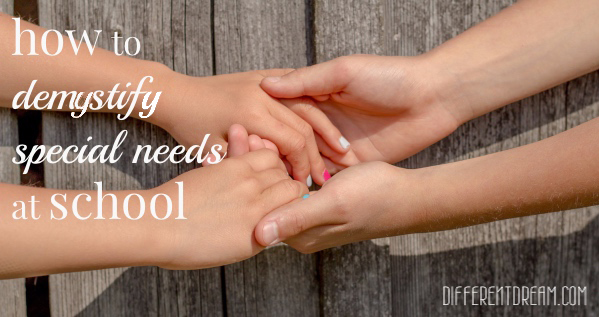How To Demystify Special Needs at School

I am grateful to my colleagues who taught me how to demystify special needs at school. A special education teacher in our building and the guidance counselor wanted to mainstream a child with developmental delays into my third classroom for subjects like handwriting and music. I was game, but unsure of how to start.
“Tell your students what’s going on,” the special education teacher advised. “Help them get to know Kendra. I’ll talk to her parents after school about how much you can say.”
After the phone call, she reported back. “Her parents are willing to talk to your class and answer their questions. They said kids will make up their own answers if they aren’t given any information. And that’s not good.”
Kendra’s parents spent a half hour telling my students about Kendra’s diagnosis and answering the children’s questions. They wanted to know about her favorite things, how to talk and play with her, and what to do when she behaved in ways they didn’t understand. The foundation laid that day made my students more caring and friendly toward Kendra, a valuable lesson for all of them.
I learned a valuable lesson about how to demystify special needs at school that day, too. I used what I learned repeatedly during my teaching career to clear up misconceptions children had about their classmates with special needs–from juvenile diabetes to developmental delays, from cerebral palsy to autism and more. The suggestions below can help you do the same.
- Enlist a colleague’s support. Ask a special education teacher, the guidance counselor, or building principal to assist you. They can help approach parents or do one on one activities with a child with special needs who doesn’t want to be part of the discussion.
- Ask parents for permission and information. Parents may offer to be directly involved in the discussion as Kendra’s parents did. Others may want you to lead it. In that case, ask what they want to be shared about the child’s disability. If you are just getting to know the child, gather information to acquaint classmates with the whole person, not just the disability.
- Give children the opportunity to ask questions. Doing so makes kids part of the discussion and provides you with insight from their perspective. They may bring up worries or past history you don’t know. Their questions can be a valuable source of information for you.
- Provide practical suggestions. Give children ideas of how to strike up a conversation, how to include children in wheelchairs on the playground, what to say to students from other classrooms who ask questions, what to do in an emergency, and when to report behaviors of children with or without special needs. Do some role play if you have time. The better equipped children are, the more likely they are to empathize and be compassionate friends.
- Follow up and provide feedback. A month or so after the initial discussion, check back with all your students. Ask how things are going for typical kids and those with special needs. You can also ask other building faculty and staff for their observations to get a well-rounded perspective. Praise children for what they’re doing well and problem-solve challenges as a group. When children know they are accountable, appreciated, and supported by the adults in their world, they will rise to the occasion.
The more we do to demystify special needs at school when children are young, the more likely they are to embrace all their peers wherever they meet—in the community, at church, and eventually in the workplace and the wider world.
Do you like what you see at DifferentDream.com? You can receive more great content by subscribing to the quarterly Different Dream newsletter and signing up for the daily RSS feed delivered to your email inbox. You can sign up for the first in the pop up box and the second at the bottom of this page.
By Jolene
Jolene Philo is a published author, speaker, wife, and mother of a son with special needs.
2 Comments
Submit a Comment
Subscribe for Updates from Jolene
Related Posts
Jesus Loves Me This I Know
Mark Arnold takes comfort and encouragement from his son’s rendition of “Jesus Loves Me,” which has been shared with so many.
Greater Love for Caregiving Parents
Karen Wright explains how her own grief about her son’s disability has created in her a greater love for caregiving parents.
Does God Speak Dutch?
Guest Blogger Steve Harris ties a favorite Christmas movie to a favorite poem to bring encouragement to special needs parents.






Lillian, the parents I worked with were always eager to raise awareness and understanding regarding their kids. This practice made a huge difference in classroom climate as the kids respected one another and didn’t need to make up stories to explain what was beyond their experience.
Thank you for having the courage to step in and bring in the parents to help the students understand. My husband and I found the public school system a bit of a challenge. My daughter had a great teacher and advocate, but would it did not work. Children I believe are more understanding and often times ask innocent questions that are on the minds of everyone. It is probably one of the first times the parents were able to have a real, authentic conversation to address questions.